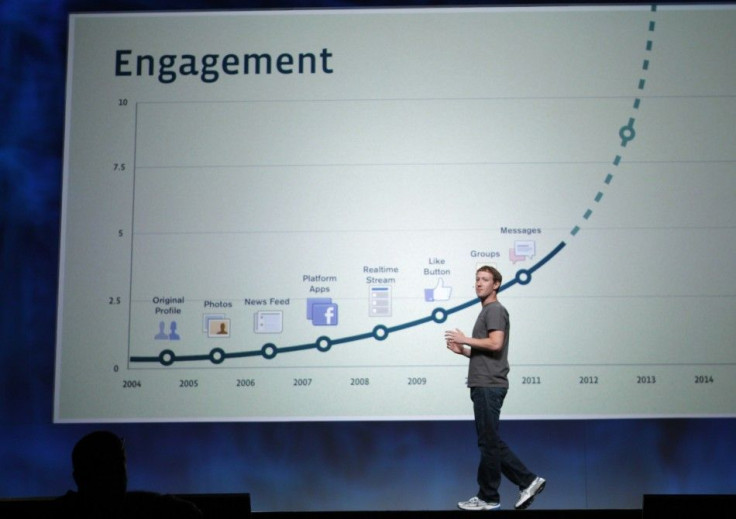Why Facebook is Force-Feeding Timeline To Everyone

It's been nearly six months, but finally, Facebook will be forcing all of its users to upgrade to Facebook Timeline, the latest installment of the popular social network. The announcement was made on Facebook's official blog:
Last year we introduced Timeline, a new kind of profile that lets you highlight the photos, posts and life events that help you tell your story, said Paul McDonald, an engineer at Facebook. Over the next few weeks, everyone will get Timeline. When you get Timeline, you'll have 7 days to preview what's there now. This gives you a chance to add or hide whatever you want before anyone else sees it.
Since wall posts, photos and more have been logged since 2005, most people will spend a few days removing old, outdated or embarrassing content. For those that can't wait to upgrade to the latest version of the popular social network, the company has set up a Facebook Timeline introduction page, where Facebook users can learn more about the update.
Though security settings will not be altered as a result of Facebook Timeline, Facebook will be pushing toward more sharing using its platform.
The Facebook Platform
Facebook Open Graph -- an API (application programmig interface) that allows Web sites to exchange information with the social network -- is the driving force behind Facebook's new business strategy. Though an early version of Open Graph was introduced in 2010, giving people the ability to like sites and pages, other iterations of Open Graph will be unveiled in the near future.
In essence, Facebook will call for companies to build apps for the social network using Open Graph in order to broadcast certain actions there. The information exchange that occurs between Facebook and another company is what the company calls Facebook Platform. One instance in which a free-flowing data exchange will happen is multimedia consumption.
When unveiling Facebook Timeline, founder Mark Zuckerberg also rolled out his vision of the new Facebook Platform. He did so by announcing a few initial partners, many of which were publications such as The Daily, The Washington Post and The Guardian. The new Facebook Platform allows people to share the content they consume at each publication in real time. The sharing -- or broadcasting to Facebook -- would happen automatically after the user gave permission to the app just once.
One of the first places most people witnessed the change was with Spotify, the popular music streaming service. Spotify allows users to share the songs they're listen to in real time with their Facebook friends. Automatic sharing -- or participation on the Facebook Platform -- takes just one click. Automatic sharing can always be disabled from such Facebook Apps in the Account Settings>Apps section of Facebook.
Music and reading are only the beginning. Eventually, Zuckerberg and company would like to have several actions broadcast to Facebook. Some of the verbs that will eventually be introduced include want and own, rather than just having to like an object. In addition, services such as Digg.com are using the verb dugg to describe when somewhat votes up an article on their platform, which is typically referred to as digging. Those actions and many more will be introduced to Facebook Platform overtime.
Zuckerberg's Dream World
Zuckerberg has never been shy about where he sees the Web heading. During his presentation at F8, he remained very excited about the possibilities that seamless sharing would present to people. He reiterated that enthusiasm during an interview with Charlie Rose:
If Apple or Google wants to build a product, they typically go build it, said Zuckerberg. If Facebook [wants] to help rethink the way people listen to music or watch movies, we build a platform on top of which people connect, and we enable all these companies, dozens of companies, to connect.
Sheryl Sandberg, the COO of Facebook, emphasized many of the same points that Zuckerberg made during the Charlie Rose interview:
Our one thing that is the basis of our partnership strategy and our partnership approach is that we build the social technology, [and other companies] provide the [media], Sandberg said. We don't want people to use Facebook to watch movies or read newspaper articles. We want to provide the social technology.
Though sharing will be easier than ever, some are concerned by the idea of seamless sharing. In a letter to the New York Times, a laboratory associate and professor from Yale wrote, Generation S (for sharing) has lost sight of prior privacy norms and now freely shares all, from the banal to the most intimate.
The authors, who specialize in the biomedical field, elaborate:
And with the advent of things like digital medical files - potentially easily shared online - the disclosure of heretofore very private medical information could have real-life consequences, particularly for the sharer's relatives, who have common medical and genetic information but who themselves often wisely choose to keep that information private.
Whether or not the easy sharing becomes a slippery slope of everything being public remains to be seen. But while we all wait for the future of the social web to unfold, one thing is certain: Facebook is the most prominent platform in the arena. The social network accounts for 67 percent, two-thirds, of the social media market share with more than 800 million global users.
MUST READ - iPad 3 Rumors Roundup: From Specs to Release Date and Everything Else In Between
MUST READ - iPad 3 Features: What to Expect and Not to Expect (Rumors Roundup)
MUST READ - iOS 5 Untethered Jailbreak Absinthe: Should You Jailbreak Your A5 Device?
MUST READ - MacWorld-iWorld Expo 2012: Top 10 Must-Have Gadgets, Software and Apps (PHOTOS)
© Copyright IBTimes 2025. All rights reserved.





















